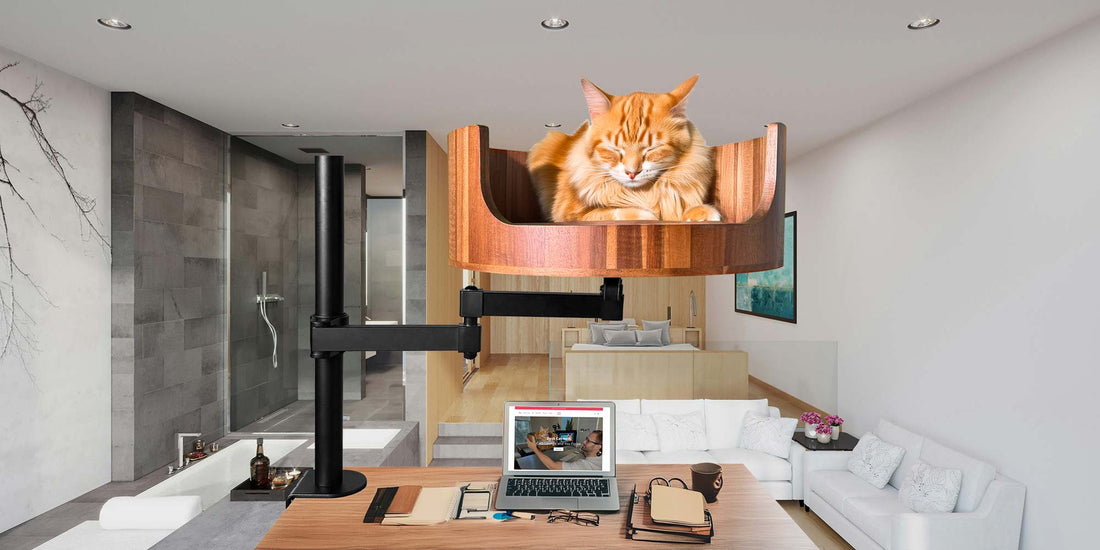
Why Does My Cat Purr So Loud? Understanding Feline Sounds
Share
If you have a furry feline friend at home, you may have noticed that your cat purrs loudly at times. But have you ever wondered why your cat purrs so loudly? In this article, we will explore the reasons behind this common feline behavior and help you understand the various sounds that your cat makes.
Whether your cat is purring, meowing, or hissing, understanding feline sounds is essential for deciphering your cat's mood and intentions. Cats use purring as a form of communication, and the volume of their purrs can vary depending on their emotions and surroundings. By understanding the reasons behind your cat's loud purring, you can better interpret their needs and strengthen the bond between you and your furry companion. So sit back, relax, and let's delve into the intriguing world of feline sounds together.
1. Cats purr as a form of communication and comfort, often to express contentment or soothe themselves.
2. The volume of a cat's purr can vary based on their mood, breed, and individual personality.
3. Loud purring may indicate a high level of happiness or excitement in a cat, while quieter purrs can convey relaxation.
4. Cats may also purr to signal hunger, pain, or stress, serving as a way for them to solicit attention or care.
5. Understanding and interpreting your cat's purring can help strengthen your bond and meet their needs more effectively.
Understanding Feline Purring
Feline purring is a unique vocalization that cats produce, often associated with contentment and relaxation. However, cats may also purr when they are in pain or stressed. Understanding the reasons behind a cat's purring can provide insights into their emotional state and overall well-being.
Why Some Cats Purr Louder Than Others
Just like humans, cats have different vocalizations and ways of communicating. Some cats may naturally have louder purrs due to physical differences in their vocal cords or respiratory system. Additionally, a cat may purr louder when they are seeking attention or trying to communicate a specific need to their owner.
Factors That Influence Cat Vocalization
Various factors can influence a cat's vocalizations and the volume at which they purr. These factors may include the cat's breed, age, health status, and personality. For example, some breeds, such as Siamese cats, are known for being more vocal than others. Likewise, older cats may purr louder due to age-related changes in their vocal cords.
Signs of Abnormal Vocalization in Cats
While purring is a normal behavior in cats, excessive or unusually loud purring could be a sign of an underlying health issue. If your cat suddenly starts purring loudly or more frequently than usual, it's essential to monitor their behavior and consult with a veterinarian if necessary. Other signs to watch out for include changes in appetite, lethargy, or difficulty breathing.
How to Interpret Your Cat's Vocalizations
By paying attention to your cat's vocalizations and body language, you can better understand their needs and emotions. If your cat is purring loudly while rubbing against your leg, they may be seeking attention or affection. On the other hand, if your cat is purring loudly while hiding or crouching, they may be feeling anxious or fearful. Learning to interpret your cat's vocalizations can help strengthen your bond and improve their overall well-being.
Frequently Asked Questions
Why does my cat purr so loud?
Cats purr for various reasons, such as expressing contentment, seeking comfort, or even communicating with their owners. Some cats naturally have louder purrs than others, and it can also depend on the individual cat's personality and breed.
Is a loud purr a sign of a health issue?
In most cases, a loud purr is not a cause for concern and is perfectly normal. However, if your cat's purring suddenly changes in volume or frequency, it may be worth consulting with a veterinarian to rule out any underlying health issues.
Will the Desk Cat Nest help reduce my cat's loud purring?
While the Desk Cat Nest provides a cozy and comfortable space for your cat to relax, it may not directly impact the volume of your cat's purring. However, creating a comfortable environment for your cat can help promote relaxation and reduce stress, which may indirectly affect their purring behavior.
Can I train my cat to purr more quietly?
Cats purr instinctively, and it can be challenging to train them to purr more quietly. Instead of trying to change your cat's natural behavior, focus on providing a comfortable and stress-free environment to help your cat feel secure and content.
In conclusion, providing your cat with a comfortable and cozy space, such as the Desk Cat Bed, can help address the issue of why your cat purrs so loud. This specialized bed offers a soft and secure spot for your feline friend to relax, reducing stress and promoting calmness. With its durable construction and plush materials, the Desk Cat Bed provides a valuable solution for creating a peaceful environment for your cat, ultimately leading to quieter purring sessions. Invest in the Desk Cat Bed today and give your cat the comfort they deserve.



















































